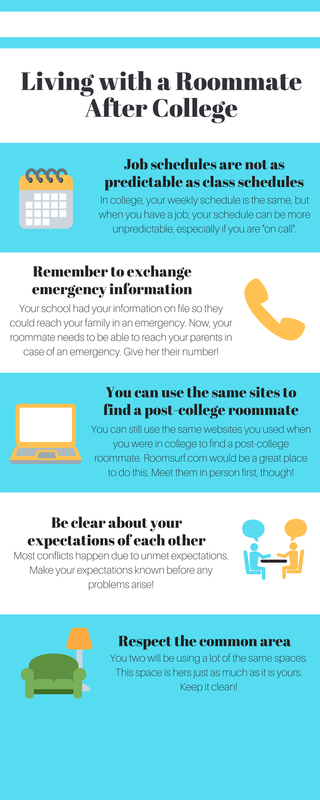Guide to Living with a Roommate After College
Given the rising cost of housing nowadays, it’s likely that you will have to live with a roommate, even after you graduate from college. If you were a college student, you probably already have some experience living with a roommate. In many ways, living with a roommate after graduating is similar to living with a roommate in college. You still need to adhere to the basic rules of sharing a space with someone else, such as: communicate your expectations to each other early on in the relationship and respect each other’s personal space. But living with a roommate after graduating is different in many ways, too. For example, it might be more difficult to memorize your roommate’s schedule, since a full-time job schedule might not be as regular as a college student’s class schedule. Now, let’s talk about some tips for living with a roommate after graduation. We’ll start by discussing the similarities and differences between living with a college roommate and a post-college roommate.
Here are some ways your roommate relationships change after graduation.

You need to be considerate of your roommate’s financial situation
In college, it’s almost like everyone is equally poor, so both you and your roommate try hard to save as much money as possible. However, after you graduate and you dedicate your life to a full-time job, there is a greater chance that there will be a discrepancy between your income and your roommate’s income. If you make more money than your roommate does, be considerate of her financial circumstances. For example, don’t push her to pay extra for things you don’t necessarily need (like faster Internet, if the Internet you already have works just fine), or if you can contribute a little bit more to the grocery fund on a certain week, do it. Of course, if she is on board with any extra expenses, that’s a different story. Just don’t force her to do something that will cause financial strain for her. Yes, there is only a slight chance this will happen, it’s possible you and roommate will have similar financial situations. But money is an extremely sensitive topic, especially now that you are making your own and not depending on Mom and Dad anymore.
Job schedules can be more unpredictable than class schedules, so don’t expect to memorize your post-grad roommate’s schedule
In college, you and your roommate had classes or club meetings at the same time every week. It’s easy for your roommate to memorize your schedule and to know where you are at almost any time. For example, if it’s 10 a.m. on a Tuesday, your roommate will know that you are in your biology class, and if it’s 2 p.m. on a Wednesday, you will know that she is in her psychology class. This is helpful, as your roommate will know when to expect you back in the room. She will know when she has the room to herself, and she will also know when to call for help if you don’t show up at the room. As a college student, your schedule is relatively the same from week to week, so it’s easy for your roommate to memorize and to know where you should be.
On the other hand, when you have a full-time job, your schedule (and your roommate’s) can be more unpredictable. This is especially true if one of you has an “on call” job, or if you need to pick up various shifts at different times throughout the week. These unpredictable schedules mean it’s harder to know if she is in the apartment at any given moment. Of course, if you would like, you can solve this issue by using resources like Google Calendar and syncing your calendars. But more often than not, post-grad roommates do not need to memorize each other’s schedule. Don’t expect to know your post-grad roommate’s schedule or where she is at any time.
You don’t know how much time you have together, so enjoy the time you do have!
College roommates usually stay in the same room together throughout the course of one academic year. Of course, there are exceptions, some roommates stay together for a longer or shorter time period, but one year is the norm. Even if you no longer live together, you are likely to still see your roommate around campus, too, so it’s easy to keep in touch with them.
But after graduation, there is no timeline. Usually, any roommate can leave at any time, as long as they find someone to replace them in time (this is to keep the remaining roommate from having to pay the entire rent herself). At this age, the world is at our fingertips, and we don’t have much tying us down to any specific place, so why not accept an amazing opportunity somewhere else? This means that you don’t know how much time you and post-grad roommate will have together.
If you like your post-grad roommate, cherish the time you have together because when the world is at your fingertips, nothing is certain!
Exchange emergency information with your roommate
Many people don’t think to do this, but it is important for your roommate to have your emergency information. Back in college, your school had your emergency information. If there was ever a problem, the school could contact your parents. But now that you’re not in school anymore, what will you do if something happens to you and your roommate doesn’t know how to reach your family? For that reason, I suggest that your roommate should have a few basic pieces of information, such as:
- A list of all your allergies, and what to do if you have an allergic reaction.
- Any medical conditions you have that she should be aware of, and what to do if you have an episode. For example, if you have epilepsy, what should your roommate do if you have a seizure?
- Your doctor’s name, office address and phone number.
- A phone number where she can reach your family.
Of course, you might not feel comfortable giving all that information to your roommate, and that’s okay. At least give her a phone number where she can reach your family; that should be enough to help during an emergency situation.
You probably won’t be super close to your post-grad roommate
Yes, they tell you in college that you don’t have to be best friends with your roommate. The same thing rings true for a post-grad roommate. In college, it’s easy to bond with your roommate over having a similar “college experience” at the same school. Not so with a post-grad roommate. It’s harder to find things to bond over, especially if your lifestyles are very different. This is not a bad thing, it is just something to think about when having a post-college roommate.
Now that we have touched on the differences between a college and a post-college roommate, let’s talk about the similarities between the two. There are many similarities, because after all, you are still sharing a space with someone. Here we go!
You can find a post-grad roommate the same way you found a roommate in college
Maybe you can’t use your university’s roommate matching system anymore, but you can use many other roommate search tools that are also popular with college students. Of course, whenever you find a roommate over the Internet, you should try to meet with them in person first. This is just to make sure they aren’t creepy scammer!
Don’t forget that you can also utilize your “in real life” circle to find a roommate. Ask your friends, family members, or co-workers if they know of someone who is looking for a roommate. After all, wouldn’t you be more comfortable rooming with someone your co-worker or friend can vouch for, rather than a stranger you met on Craigslist?
Finding a post-grad roommate isn’t that hard after all!
Be clear about your expectations
Whenever you live with a roommate, whether you are in college or if you are already graduated, most roommate problems arise from unmet expectations. To avoid these problems, be clear about your expectations. Although it might sound “college-y”, you should consider drafting a roommate agreement with your post-grad roommate. Even if you decide not to write up an agreement, you should at least discuss a few things, such as:
- How will you split the rent? 50/50? Or does the one with the bigger room have to pay more?
- How will you split the household chores? Will you have a chore schedule?
- Will you share food? Will you share only certain foods, like the gallon of milk and the dozen eggs? If you do plan to share food, who will pay for it?
- What items, if any, can your roommate borrow? Under what conditions can she borrow them? For example, can she borrow your hair straightener if only if she asks you first and puts it back where she found it and in the condition she found it?
- What’s the policy for noise and for guests? Especially overnight guests of the opposite gender could be a problem, and so could loud music in the early hours of the morning.
- Will there be any alcohol in the apartment? This might be an important question for someone who would rather live in a substance-free environment.
It’s best to discuss your expectations of each other early in the roommate relationship. Preferably, you should have these ground rules established before any major issues between you and roommate arise.
When problems arise, face them head-on. Do not be passive-aggressive
Leaving passive-aggressive sticky notes on the bathroom mirror or on the fridge is SO four years ago. Be an adult, don’t do it! If an issue arises, don’t be passive-aggressive about it. Instead, be upfront and face the issue head-on with your roommate. For example, if your roommate is always eating your food even though you’ve already established that you wouldn’t eat each other’s’ food, don’t leave a sticky note on the fridge or send a snarky text about it. Rather, kindly remind her of your agreement.
Being upfront about an issue is a much more effective way to solve problems than being passive-aggressive.
Respect the common area
Now that you’re not living in a cramped dorm room, it’s likely your apartment will have a common area shared by you and your roommate. Please be sure to respect this common area. Do not leave a mess in the living room or kitchen. Especially do not leave your dirty dishes piled up in the kitchen sink or your stinky sneakers and socks in the living room (yes, I had a friend who lived in a multi-bedroom apartment with a roommate, and her roommate would STILL do things like that). This space is just as much your roommate’s as it is yours. Respect her right to have a clean living environment by respecting the common area.
Even after you graduate from college, you might have to live with a roommate. But now that you are out of college, some things are different. For instance, a college student’s class schedule is much more predictable week by week than a full-time worker’s schedule. Sometimes, full-time workers are “on call” or have to pick up extra shifts, so their schedules are not as predictable. This means that although you knew when your college roommate would be home, you might not know when your post-college roommate will come home.
However, with a post-college roommate, you should still follow the same general rules you followed with your college roommate. For example, communicate your expectations to each other early on in the relationship, as this will help prevent problems. Also, respect your roommate’s space and privacy. All in all, whether you are still in college or not, you should treat your roommate the same way you want to be treated, with kindness, consideration, and respect.

Interested in using our roommate matching formula to find the perfect college roommate for you? Create a profile & take the roommate quiz on Roomsurf! Get Started

